Elaph: Mohamed Khashoggi is a businessman who has invested extensively and developed projects throughout the world for thirty years. Mr. Khashoggi has, through his partnership with Dubai based SCG (Strategic Communication Group), acted as advisor to foreign institutions and governments. Mohamed and SCG have developed a unique proprietary approach to address important challenges pertaining but not limited to Media Relations in the GCC. The emphasis of these efforts was creating and enhancing an image suitable to be an attractive investment destination GCC market. Advising the client on how to identify and promote priority investments, stressing the building of effective and solid Policy Makers’ Relationships, and creating a customized approach to Diplomatic Engineering in the region.
Mr. Khashoggi has worked extensively over his career on several programs with political leaders in public and economic policy reforms, Governance reforms, image branding and enhancement
Mr. Khashoggi has spent the last 7 years in Asia expanding his consultancy business with several public and privately owned Asian institutions in China, Japan, Korea, Indonesia, Taiwan, Singapore, Laos and the Philippines. Those multibillion investment programs are involved in developing commercial sectors that will play an important role in the future economic development between Asia and the GCC. Mr. Khashoggi speaks several languages: English, Spanish, French, Italian, Arabic and Chinese.
Considering the possible ramifications, a maverick US administration can have on the region, we asked him to share some ideas as to the pros and cons of what could be expected from this incoming administration and the implementation of some of it’s more radical policies.
You have worked for many years in the nation branding sector across the political spectrum and in many countries, that vary greatly culturally.What does nation branding involve?
Nation branding can have many interpretations. For us it was always about realigning the image of a country with modern day needs and expectations. An image that people inside the country would feel really reflects their values and thus could be proud of, and for outsiders it would present the country as an attractive destination for visiting or investment purposes.
How do you improve a Nation’s image when its reputation is not well perceived in the media community and the civil society?
This depends on the country and region. Some countries are very old and their inner vision of themselves and their values are deeply entrenched. Take the UK for example. Brand UK is probably one of the best brands, country- wise, on the planet. They work hard at maintaining what they have. When they realize, they need to tweak the image to reflect current realities they do it almost imperceptibly and the results are formidable. It is the result of a combination of the political establishment and the population being very well aligned in their priorities, pulling and pushing each other in the right direction.
Then you could have a country like Japan. Their image is so entrenched in most of our minds and it is something they are proud of and don’t really want to change. They went from the worse image in the world 50 years ago to one of the best without really changing much at the core that we outsiders are immediately aware of.
Then take a country like Israel, despite all the violations they have committed over their short, recent history, there is a lot of good they have achieved and continue to achieve in technological, agricultural and of course health research sectors, that is and will, reap huge benefits for all of mankind. Abba Eban once described beautifully the inner vision Israelis had of themselves at that time: “Incomparable years of joyous creation, of a sovereignty restored, of a people gathered in, of a land revived, of democracy established.” Unfortunately, this is not the charming picture the world shares today with Abba Eban.
If they took time to really focus on to modernizing their brand, this could have an important impact on the eventual peace they would seek with their neighbors.
In your opinion, with Trump just elected President of the United States, how will this affect the Gulf Arab brand in America and Vice versa?
This is an astonishing question that would require an astonishing answer which I really don’t have now. The answer lies so deeply in the American psyche that few could understand it today even most Americans. Consider this phenomenon, Mr. Trump was able to single out Muslims so aggressively in his campaign, including the sacrosanct Gold Star parents in the US, then win by such a huge margin… then after winning appoint as head of his National Security someone who clearly despises Muslims, then call Nawaz Sharif and have a love affair on the phone?
What I am trying to say is that our image as Arabs is been tied to the image of Islam. It is unchangeable. Even the Christians who are suffering in Syria are Muslims. Basically, we have lost complete control of the narrative in the west. We have surrendered the narrative of the Arab and of Islam to whoever wants to reach opinions without consideration of real discussion or knowledge of facts. The danger is that when the Arabs had an unappealing image to the west in the sixties and seventies, it did not involve the image of Islam, the reverse is not true today.
There is a lot of work to be done and needs to be done quickly. American borne Muslims are for the first time really feeling the fear that Muslims abroad had felt for so many years. I am very encouraged though; many non-Muslim Americans are reaching out to show solidarity. The incoming administration is doing nothing. Either they are too busy, too ignorant of what is going on or, they are really intending a massive crackdown on everyone. If harassing law abiding Muslims becomes PART OF THE OF RED MEAT DIET THAT TRUMP NEEDS TO OCCASIONALLY FEED HIS CORE SUPPORTERS, then I am at a loss for words. I will quote the great Jewish scholar Arthur Cohen, “I would have no language that would tolerate the immensity of the wound.”
Will Trump’s background as a business man help him view the GCC countries as an important block in his overall economic strategy?
As a businessman, I am sure Trump has no delusions about the wealth the middle east can contribute to the investment sector in the US. He has had many dealings with wealthy Saudi’s and Emiratis, he knows what’s out there for his own business to tap into. For the economy? I am not enough of an expert on Trump’s world vision to understand what he wants from wealthy Arabs.
What must Saudi Arabia, as the biggest economy in the GCC, do to engage the Trump administration?
Three things are crucial to do immediately. First, immediately create a back-door discussion with Trump, using competent people who know how to deal with Trump’s psychology. This person or people need to be supported by a great team who can really understand the anxiety dynamics going on in the traditional political parties in the US. Second, keep your head low publicly until we know from the first hundred days what he is going to do, thirdly have contingency plans for everything and start thinking long and hard on how take back the narrative on the Arab brand.
Saudi Arabia has decades worth of relationships with the US business and political community, how important will those relationships be engaging with a Trump administration?
Again, in the long run those can be very useful in dealing with people around the administration. But remember, this is a man who loves adulation, loves rallies, he will not give those up. He will continue having those rallies with his core supporters. Especially when he has trouble in Washington or abroad. He will seek the approval of his adoring crowds above all else.
Trump has singled out Muslims as immigrants that will be banned from the United States. After the election, he has walked back on the ban idea and his limited it to countries that suffer from terrorism. That could include Muslims from countries that are NATO allies. He has also declared his intention to supervise American Muslims more closely. It seems like most of this rhetoric is a work in progress rather than having definitive ideas. What are the consequences of this type of rhetoric on the relations of the US government with the Muslim world, especially the MENA?
I cannot answer that except to say that every Muslim on the planet who can read or listen to the news will suffer greatly at being dragged into the swamp of extremism.
Some polls of Republicans in the US show that 60 percent of their voters view the trump declaration to ban all Muslims from US immigration as positive. If this turns from campaign bluster into fixed intent; can KSA step aside and declare these the internal affairs of the United States and not take public position on the issue?
That is up to the government to decide. I guess it would be part of their contingency plans. You cannot negotiate with a religion like you negotiate with Oil output. This is a very sensitive question. Let’s hope it never needs to be answered.
Most would say that the first 100 days of the Trump administration will set the tone of what is to come. That little could or should be done now. Some world leaders like Prime Minister Abe of Japan, have chosen to engage early. Is it wiser to engage now?
We keep on hearing that Trump wants to run his administration through negotiating every treaty he does not like. There are some angry men in his cabinet, some with very strong views. His Chief of Staff Reince Priebus will play a key role. It reminds of someone who once said that the Chinese Premier in the 50’s and 60’s, Zhou Enlai, was the midwife, he turned Mao’s nightmares into reality, let’s hope Mr. Priebus can do the opposite.
In other words, he is approaching the negotiating table with a big stick. At the same time, he really has no ideology outside his three core principles: America taking on too many of the world’s problems, trade agreements that are in place are damaging the country, immigrants are a terrible menace to the United States. The Arab countries have such a long wish list from the US, it is a question of rearranging your priorities with Trump. Stay away from things he does not want, engage in things you both do want. Take the low hanging fruit, then, when he settles in, you can address more difficult issues. The danger is, if you are not part of the narrative early, in a positive way, you become the target of the narrative in an even worse way then you can imagine. Once more, would you like his choice for NSA director to be making decisions for you without you having a seat at the table?
KSA has strategic and fast growing commercial ties with China. Will the Trump administration’s virulent attitude towards trade with China put KSA in a difficult position?
China is the opportunity of this generation for KSA. I have lived in the Far East for seven years. I am very aware of what our image is to the Chinese commercial establishment and the expectations they have for developing stronger economic ties with the Arab world. The business and career opportunities for young Saudis and Gulf citizens with the One Belt One Road initiative is immense. The Chinese will spend billions developing countries in our back yard. We need to be part of that narrative. It should not be considered a pivot away from Europe or the US. We can learn different things from the Chinese. Especially if we are to begin diversifying the Saudi economy. They can bring energy and take risks western companies would never even consider.
You have a lot of experience handling the Arab “brand” in the US, Latin America, Europe and for the last five years. As the only Saudi, non-technical consultant based in Asia. Can this new age of Trump bring anything positive to the Gulf Arab “brand”?
Nobody can answer this question yet. Trump is not an ideologist. He changed parties five times between 1999 and 2012. The Arab “brand” should only be defined by Arabs.
In your opinion, what are Trump’s personal attributes to leverage on by KSA or the GCC to ensure that the region will benefit from a relative stability/prosperity, until the end of his mandate?
Whoever he was in the past you cannot depend on in the future. Trump is a marketing and media expert. Beyond that he will take it as it goes. Let’s keep in mind, the end of his mandate is not necessarily the end of “Trumpism”. This is a part of America he has awakened. Why would it retreat after Trump?
One of his famous statements was “I want to take back everything from the world that we have given them”. I am not sure I know what he wants to take back from the Gulf if anything. Under current circumstances, this is not someone I am counting on to create stability and prosperity in the Arab world. It is a fantastic wake up call for the Arab world to stop fighting and redefine themselves within a context of home grown regional stability and prosperity.
If you had to advise Trump on key important issues for the region that will ensure prosperity for both the US and the Muslim world, what will be your advice?
If you are going to be a maverick than be a maverick in everything you do including the Middle East. Tone down the anti-Muslim rhetoric, stop telling the world that the US army is going into the plunder business, sit down with Arabs you feel comfortable with, private, public sector and civil society, and start your learning curve.
Although Trump has not finalized his key nominees, what is your take on this administration?
My only advice is the following. It is up to the President to select the key advisors he wants to surround himself with. It is his privilege and he should select people he feels will be competent in executing his will. For example, he chose Michael Flynn as his NSA advisor. A very important position. Michael believes that almost 1.7 billion Muslims are living with a cancer inside them. Michael has the right to his own opinion. After all he lived amongst Muslims and fought Muslims and fought for Muslims. He earned his opinion as abhorrent as it is.
The only access Trump has had with Muslims is either in a business context or watching them on the news. If he truly feels the same way as Michael, then by all means disengage and do as little as possible to at least maintain your share of the aviation and arms market in the region. But seriously stay away if you don’t want to build positive ties.
If you stayed engaged and follow Michael’s lead you will see the same angry phantom that emerged to vote for you appear in the Muslim world. These are the Muslims, hundreds of millions of them, who have never had a political agenda for their religion. They pray, they bring up their kids under the premise of the Golden Rule of every serious religion. The search for cosmopolitan religious principles found expression hundreds of years ago. Do onto others as you would want others to do onto you. This most compassionate affinity between religious systems is what is supposed to unite mankind.
These people will not all be violent but they will be furious. They may react with boycotts across the Muslim world on American consumer goods or other services. I am talking about bankers, lawyers, shepherds, fishermen, women and men. That is when brand USA is shattered for generations. The regional leaders would be powerless to engage with the US in any substantial way after that. They would just have to wait it out.
On the other hand, there is an opportunity to never forget that brand USA was one of the favorite brands in the MENA region for a very long time. Brand USA finds it way into our homes all day every day. There is an opportunity to really reach out and improve the brand, not tear it apart.
The brand really started falling apart under the surreal crusader policies of George W Bush in the region. We were at the time the most successful and probably only Gulf based, Gulf owned and western educated Nation Branding company in the MENA region. My partner called me in one day and said that the White House wanted us to put together a proposal for the US Public Diplomacy program in the Muslim world. Karen Hughes was the Undersecretary at the time. I urged them to forget about it because we had nothing to work with and we were very busy at the time. My partner reminded of the values the US represented and it was our duty out of respect for those universal values that compelled us to make the effort.
We put together the best team on the planet and came up with a brilliant program. We worked collectively over two thousand hours to come up with a strategy and a presentation. When we were ready I was asked to go to Washington and make the presentation. There were about 20 of us who had worked on this program. Experts from Europe, USA, Canada, Belgium, United Kingdom, UAE, Kuwait, Tunisia, France, Morocco, Egypt, Saudi Arabia… then the email came.
Karen Hughes would meet us on such and such a date for 20 minutes. We were shocked. Then we were hurt then we were incredulous. It was like walking up to a house on a hill to find it empty, all the doors and windows left open, the wind blowing through and no one there. I refused to demean importance of the program, the image of the US and our work by accepting the appointment. We later found out that she would not even had been at the meeting.
If Trump wants to engage then engage. Put together a counter balance to the security Dobermans in his cabinet. There are brilliant people at the state department. He should create a team of experts with some prominent American business men who know the region and find counterparts in MENA to create a magnificent and open dialogue. The same should be done by the key players in the Arab world. Everything could be discussed. This team would only come up with recommendations to their governments, civil society, media and so on. This would give Trump an amazing start and he could learn a lot. About the Middle East and about his own Muslim citizens.


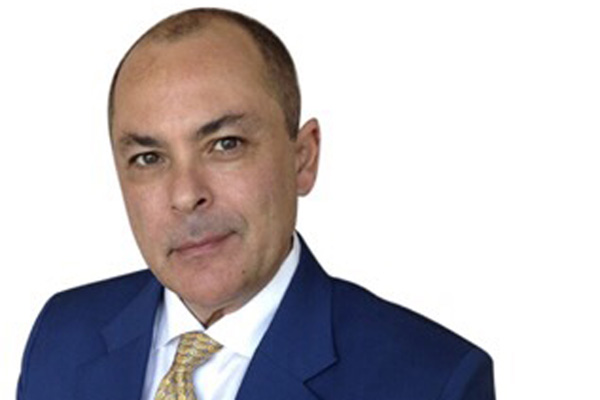



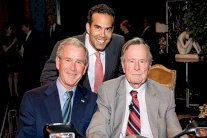
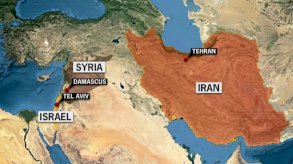
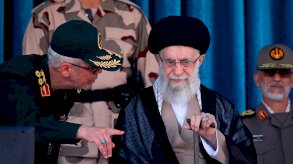
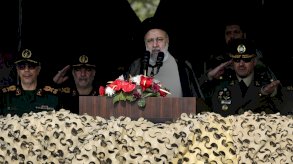

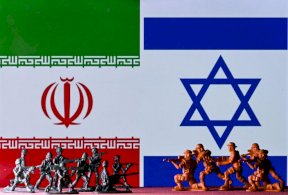
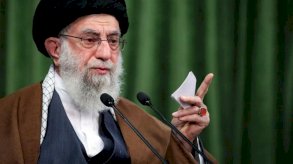

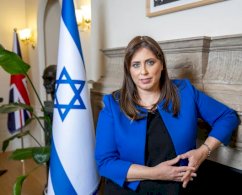
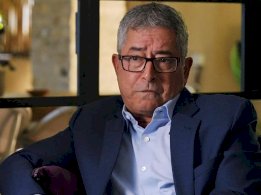
التعليقات